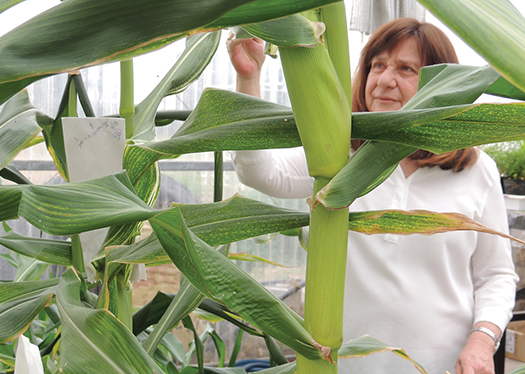
Plant molecular biologist Raquel Chan, whose research led to the development of HB4 wheat, inspecting corn plants at the Litoral Institute of Agrobiotechnology. (Photo courtesy of Conicet)
Argentina hopes to soon become the world’s first country to sell transgenic wheat commercially following the recent decision by a key customer, Brazil, to allow imports of Argentine-made gene-modified wheat. Named HB4, the wheat has been bioengineered to incorporate a sunflower gene that gives it drought resistance. It has also been genetically altered to grow in soil treated with glufosinate ammonium herbicide, a capability its backers say will ensure reduced competition from weeds, thereby increasing yields.
HB4 was developed by scientists at the Universidad del Litoral, a public university in Argentina, and the government’s National Scientific and Technical Research Council (Conicet) in collaboration with two companies—Bioceres Crop Solutions of Argentina and Florimond Desprez of France. Argentina’s government approved commercial cultivation of HB4 in October of 2020 with one condition—that Brazil first must authorize imports of the wheat into its market, a crucial one for Argentine wheat producers. Brazil is Argentina’s biggest wheat customer by far, buying nearly half of the country’s 8.4 million tons in wheat exports in the first 10 months of 2021.
Bioceres says that while awaiting Brazil’s decision, it carried out experimental plantings aimed at building seed stocks. The decision came on Nov. 11, when Brazil’s National Biosecurity Commission (CTNBio) issued its approval. It removed a key hurdle preventing sales of HB4 seeds to Argentine farmers and the marketing in both Argentina and Brazil of wheat grown from those seeds. Bioceres is seeking HB4-wheat import approvals from additional countries including Australia, Colombia, Indonesia, Paraguay, South Africa, the United States and Uruguay, according to the company and the Argentine Agriculture Ministry.
Argentine officials welcomed Brazil’s approval, saying use of the new wheat will help preserve yields amid adverse weather conditions caused by climate change. They argue it also shows Argentina can take a direct role in steering the biotechnology development currently propelling agriculture, a key industry for the country. In the first 10 months of 2021, sales of Argentine farm products abroad generated US$28 billion, nearly half of the country’s total export earnings. Says Argentine Agriculture Minister Julián Domínguez, using the example of Covid-19 vaccines: “The pandemic has highlighted the fight for control of knowledge, so this news is very hopeful for Argentina.”
Reaction among environmentalists, some academics and even agribusiness leaders has been wary or worse. Green advocates and certain researchers have long criticized monoculture farming associated with genetically modified seed varieties, saying it causes soil exhaustion, excessive use of chemicals, deforestation and increasingly resistant weeds and pests.
Agribusiness not all aboard
Not all agribusiness leaders embrace HB4, either. Some worry the already significant public resistance to transgenics in export markets might intensify because HB4 wheat—unlike many other crops grown with transgenic seeds, such as soybeans and corn—is exclusively for humans. This, they say, could cause problems for Argentina’s conventionally grown wheat if foreign customers suspect it might be contaminated with the gene-altered variety. Says Gustavo Idígoras, president of the Cereal Exporters Center, an association of Argentine agricultural producers: “We will strengthen controls to avoid contamination, but we worry that doors around the world will be closed on us.”
As for Brazil, Idígoras says: “We still don’t know whether consumers will accept [transgenic wheat].” Indeed, CTNBio’s decision might not be the final word. Administrative steps in Brazil and Argentina still must be taken before HB4 seed sales and wheat exports can begin. Potentially, these could attract ongoing opposition from stakeholders wary of transgenic wheat. Among the skeptics is Abitrigo, an association of Brazilian grain processors. On the day Brazil announced it would allow imports of HB4 wheat, Abitrigo pointed out that all varieties of genetically modified wheat developed in the world over the past two decades were abandoned in the face of opposition. The association faulted Brazilian officials for failing to sound out the country’s consumers and cautioned that Brazilian food manufacturers could face resistance in export markets over fears their products might contain HB4 wheat.
Fernando Vilella, a professor of agribusiness at the University of Buenos Aires, argues such warnings are overblown. “It is not true the Brazilians reject transgenics for human consumption, because they consume transgenic sugar grown in Brazil,” he says. Reflecting the view of many in government and some in academic circles, he sees the commercial sale of HB4 as a step forward for agriculture and for Argentina. Says Vilella: “We should celebrate this achievement of Argentine science and technology in a public-private partnership.”
GM roots run deep
The cultivation and sale of transgenic wheat would not be a departure for Argentina, which has used gene-modified seeds for 25 years. The country’s top two crops in terms of land under cultivation—soybeans (this year 16.2 million hectares, or 40 million acres) and corn (7.9 million hectares, or 19.5 million acres)—are grown nearly exclusively with seeds bioengineered to tolerate herbicides or ward off pests. Raquel Chan, the Universidad Nacional del Litoral scientist whose research spurred the development of HB4, rejects the view that farming with transgenic crop varieties is necessarily incompatible with environmental protection, pointing out HB4 wheat consumes less water than conventional wheat.
“It is true there is a need in science to reduce the use of agrochemicals or invent something more compatible with the environment that can combat weeds and insects that attack crops,” Chan, a plant molecular biologist, said recently in an interview with EcoAméricas. “But that is not to say that it would be viable to have a wholesale return to traditional agriculture with no use of agrochemicals, because the yields would be much lower.”
Advocacy for greener agricultural models is building. Last year, some 1,400 scientists associated with Argentine environmental and social advocacy groups formed a collective called “Clean Wheat” in response to the government’s conditional approval of HB4. They are continuing their campaign in the wake of Brazil’s decision to allow imports of the wheat.
- Daniel Gutman